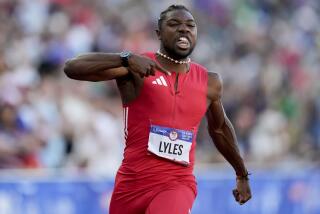Seoul ’88 : When East Meets West on Track in Germany, It’s Really No Contest
- Share via
ROSTOCK, East Germany — Even in the world’s track and field capital, football is king.
We, of course, are referring to European football, which requires short pants to play and a long attention span to watch. Saturday, the start of the second day of the three-day East German track and field championships was postponed for three hours so as not to interfere with soccer’s European Championships, which were televised live from Munich, West Germany.
It was a festive weekend in Rostock, one of the last the city’s 244,000 residents will enjoy before the tourists invade for their summer vacations on the Baltic Sea. They should find the weather more accommodating than it was last week--cold and cloudy with intermittent rain. The breeze smelled not of salt from the sea but of coal from the furnaces that warm the homes.
Rostock, located 140 miles north of East Berlin and a 2 1/2-hour ferry ride from Denmark, is one of East Germany’s major port cities and a center for shipbuilding. It also was the site of a large naval base before 1945, when the city was virtually destroyed by Allied bombs. Today, its most visible sailors are those trained at the local sports club for Olympic yachting.
The East German Track and Field Assn. brought its 39th National Championships to Rostock for the first time as a favor to the city’s most celebrated athlete, Marita Koch, who was honored in a ceremony Sunday at the 35,000-seat Baltic Stadium. She retired after the 1985 season but still holds the world record in the 400 meters and shares the world record in the 200 meters with East Germany’s reigning track and field queen, Heike Drechsler.
Koch, 31, has been missed, but not so much that the rest of the world has noticed. East Germany’s women won six gold medals in the World Championships last summer in Rome, and, if everything goes their way, could win 10 in the Olympic Games Sept. 17-Oct. 2 at Seoul.
East Germany’s men, probably because the competition is more refined, do not dominate. But they have improved. After winning four gold medals in Rome, they are expected to challenge in six events at Seoul.
They have even discovered a sprinter, although he probably is two years away from making an impact internationally at the senior level. Sven Matthes, 18, was timed in 10.18 seconds in the 100-meter semifinals Saturday to break the European junior record, then proved it was not a fluke an hour later with a winning time of 10.19 in the final.
“I thought I should not think about it and just do it again,” said Matthes, who is from East Berlin.
Matthes’ performance reminded East Germans of a day in Dresden 11 years ago when another young sprinter emerged. Marlies Gohr ran a 10.88 in 1977, becoming the first woman under 11 seconds in the 100 meters. It still stands as a world junior record.
Gohr became the world’s dominant sprinter over the next six years, breaking the world record twice more in the 100. After winning in the 1983 World Championships, she would have been favored for the gold medal in the 1984 Olympics in Los Angeles if the East Germans had not boycotted the Games.
But in last year’s World Championships, Gohr, suffering from a hamstring injury, failed to advance beyond the quarterfinals. With East Germans Silke Gladisch Moeller and Drechsler finishing first and second in the 100, it appeared as if the final chapter in Gohr’s brilliant career might have been written.
Instead, Gohr, 30, used the disappointment as motivation. She has beaten Moeller twice this season, including Saturday in the 100-meter final. Gohr caught Moeller at 70 meters and outleaned her at the tape, using her experience to win her 10th national championship. Both runners were timed in 11.07.
Moeller, who also was the world champion in the 200, finished second in that event Sunday, but there was no shame in it because the winner was Drechsler, whose time of 21.84 is the best in the world this year. Dreschler also won the long jump Saturday at 23 feet 7 1/2 inches.
Drechsler, 23, is the world’s best woman athlete east of Jackie Joyner-Kersee, which has created a problem for East German officials in attempting to determine which events Drechsler will enter at Seoul.
She is certain to compete in the long jump, in which she shared the world record with Joyner-Kersee until two weeks ago, when the Soviet Union’s Galina Chistyakova broke it.
But Drechsler has hinted that she might not run the 200 because the quarterfinals are on the same day as the long jump finals. The East Germans, however, would probably rather have her in the 200 than the 100, in which they already have a strong Moeller-Gohr entry.
“It’s clear what to do,” Drechsler said Saturday, smiling mischievously. “But it’s a secret.”
There were no world records broken during these championships. But the results did not disappoint the East Germans, many of whom thought that they left their best performances at the previous weekend’s dual meet against West Germany in Dusseldorf.
Even though it was the first time the two Germanys have met in a dual meet, the crowds at Dusseldorf--6,000 the first day and 8,000 the second day--were lost in a 68,000-seat stadium.
Asked if West German spectators stayed away because they were too enthralled with the European soccer championships in their country, a correspondent from the German Press Agency said, “No, it was because they didn’t want to see the blue shirts win everything.”
The blue-shirted East Germans did not win everything, although 6 victories in 41 events did little to console the West Germans. East Germany’s women won 16 of 17 events.
The meet’s only drama revolved around Wolfgang Schmidt, the dissident discus thrower who spent 16 months in an East German prison after being charged with possession of a handgun and attempting to leave the country illegally. The former world record-holder was allowed to leave East Germany last November and now competes for West Germany.
Initially, the West Germans did not name Schmidt to their team for the meet, fearing they would jeopardize their improving relations with East Germany. But during the week before the meet, the East Germans indicated that they did not care one way or the other.
“We know of no issue named Wolfgang Schmidt,” an East German track and field official said.
Schmidt became an issue on the victory stand when, after finishing third, he tried to shake hands with the winner, Jurgen Schult of East Germany. Schult, the world record-holder, smiled awkwardly but did not offer his hand in return.
Quoting unnamed East German athletes, West German newspapers reported that the East Germans were advised by their team leaders to ignore Schmidt.
Schult denied that during an interview last week at his sports club in Schwerin, 60 miles southwest of here. He said his refusal to shake hands with Schmidt was of his own initiative.
“From a sports side, he was my example when I was younger,” said Schult, 28, who is four years younger than Schmidt. “But from a personal side, I’ve always had difficulty understanding his behavior.
“He is very eccentric and very egocentric. He was captain of the national team because of his good performances, not because he was popular. He had only a few friends on the national team.”
One of Schmidt’s friends was shotputter Udo Beyer, whose streak of 10 straight national championships was broken Friday by world record-holder Ulf Timmerman. Beyer, 32, said during an interview following the competition that he visited Schmidt in prison, although Schmidt said earlier this year that Beyer’s request to visit him was rejected. Beyer said he and Schmidt did not talk in Dusseldorf.
“This is a problem of Wolfgang’s,” Beyer said. “It is not my problem. When he go (from the East), he speak not with me. I think that was the end of the friendship.”
But Beyer said he believes Schmidt can return to his previous form if he trains diligently. With the pressure of the dual meet behind him, Schmidt relaxed and threw the discus 223-10 last week to break an 11-year-old West German record.
There was little intrigue at the national championships, other than a rumor that East Germany’s world champion intermediate hurdler Sabine Busch had not run this year because her brother was having problems of an unspecified nature with the police in their hometown of Erfurt.
Knowledgeable sources said that was not true. Busch, who said she has been sidelined by an ankle injury, appeared in good form Saturday, running a 1988 world-best of 54.11.
The most striking difference between the national championships here and in the United States is not in the quality of the athletes but in the quantity. The United States has fewer potential medalists but considerably more athletes who meet Olympic qualifying standards.
There were heats in several events that had five or fewer entrants. Busch ran in a semifinal heat Friday with only one other hurdler. Some of the finalists in more than one event would not have been competitive in a good U.S. high school meet.
The East Germans pride themselves on their efficiency, saying they get the most from a relatively small talent pool. They say they will not send an athlete to a major competition unless he or she is considered a potential finalist.
Gerd Wessig, who upset the West Germans in the high jump at Dusseldorf, won the competition here with a jump of 7-5, over the Olympic qualifying standard of 7-4 1/2, but the East Germans say they will not send him to Seoul unless he clears 7-8 before September.
“This is normal,” said Wessig, a chef in Schwerin. “We had no high jumpers at the world championships in 1983 or 1987.”
In all likelihood, East Germany will not send men to the Olympics in six events. East German women will be represented in all but one event.
As Volker Kluge, spokesman for the East German Olympic Committee, explained, “We don’t have the monetary resources to send athletes as tourists.”
More to Read
Go beyond the scoreboard
Get the latest on L.A.'s teams in the daily Sports Report newsletter.
You may occasionally receive promotional content from the Los Angeles Times.






